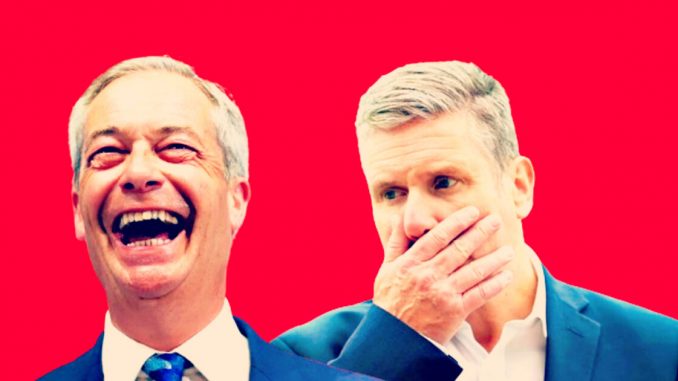
Farage’s Reform UK is surging, Starmer’s Labour is sinking.
Published September 20, 2025
Prime Minister Keir Starmer is facing the most perilous moment of his premiership after a shock poll revealed Labour tied with the Conservatives at historic lows, while Nigel Farage’s Reform UK has stormed into a commanding lead — outpacing Britain’s two traditional parties combined.
According to a Find Out Now poll conducted September 17–18 and reported by The Telegraph, both Labour and the Conservatives have slumped to 16 percent each, while Reform UK has climbed to 34 percent. This makes Reform the first party in modern history to eclipse the combined support of both establishment rivals.
Labour in Freefall
For Labour, the latest poll numbers are nothing short of catastrophic. At just 16 percent, the party is now polling at its lowest level since taking office, barely more than a year after securing power. What was once heralded as a fresh mandate for stability has disintegrated into a crisis of confidence.
Starmer entered Downing Street promising competence after years of Conservative infighting. But voters now see a government consumed by its own divisions. The resignation of Deputy Leader Angela Rayner — once a key grassroots connection to Labour’s working-class base — has left a gaping hole in the party’s leadership. The sacking of Lord Mandelson, one of Starmer’s closest advisers and architects of New Labour’s centrist revival, signaled deeper factional strife behind the scenes.
On policy, Labour has struggled to satisfy both wings of its coalition. Left-wing members accuse Starmer of abandoning progressive promises, while moderates warn that his leadership lacks clarity and direction. This vacuum has opened the door for Reform UK to claim ground once thought untouchable — particularly among blue-collar voters who swung to Labour in 2024 but now feel betrayed.
The broader issue for Labour is not just scandal or strategy, but trust. Voters who turned to Starmer to provide stability now perceive weakness. His cautious, lawyerly style, once seen as a steady hand, increasingly looks indecisive against Farage’s blunt populism.
Unless Labour can reconnect with its traditional base while offering a bold vision to the broader electorate, its fall could accelerate into something far more permanent: the collapse of its status as one of Britain’s two dominant parties.
Conservatives on the Brink
For the Conservative Party, the poll offers no consolation. Once regarded as Britain’s natural party of government, the Tories now languish at just 16 percent — the same as Labour, but without the advantage of incumbency. Their failure to capitalize on Starmer’s collapse highlights just how far the party has drifted from its traditional support base.
Since their crushing defeat in 2024, the Conservatives have struggled to find a unifying message. Leadership infighting has left the party rudderless, torn between those who want to rebuild around a moderate, business-friendly vision and those urging a harder shift to the right to blunt Reform UK’s rise. Instead of renewal, voters see confusion — and many lifelong Conservatives are abandoning ship.
The emergence of Reform UK as the dominant voice of the right has been particularly damaging. Nigel Farage’s straight-talking populism has tapped into the frustrations of disaffected Tory voters who feel betrayed on immigration, sovereignty, and economic stagnation. In key constituencies, Reform is now outpacing the Conservatives, raising the real possibility that the Tories could lose their role as the principal opposition force.
Donors and grassroots activists, once the backbone of Conservative resilience, are also wavering. Reports suggest some financiers are already diverting resources toward Reform, sensing the Tories are no longer a winning investment. Without money, volunteers, or momentum, the Conservative Party risks sliding into irrelevance — a dramatic fall for an institution that has governed Britain for much of its modern history.
Unless the Conservatives can redefine themselves quickly and decisively, they may not merely lose the next election — they may cease to exist as a major political force. For a party that has always prided itself on survival, the present crisis looks less like a stumble and more like the brink of extinction.
The Farage Factor
Nigel Farage has long been one of the most polarizing figures in British politics — a man dismissed by critics as a rabble-rouser yet admired by supporters as a truth-teller unafraid to challenge the establishment. For years, his campaigns for Brexit and against unchecked immigration positioned him on the political fringe, shaping the national conversation but never translating into electoral dominance. That perception may now be changing.
At 34 percent, Reform UK is no longer just a protest movement but the leading political force in the country. Farage has managed to consolidate disillusioned voters from both Labour and Conservative camps, uniting working-class northerners angry about economic stagnation with southern middle-class voters who feel betrayed on immigration and sovereignty. This broad coalition reflects a deeper appetite for bold, uncompromising leadership in an era when traditional parties appear timid and directionless.
Farage’s political strength lies in his ability to connect emotionally with voters. Where Keir Starmer is seen as overly cautious and Conservative leaders as divided and uninspiring, Farage projects conviction and simplicity. His rhetoric on controlling borders, cutting bureaucracy, and prioritizing national interests resonates with citizens who believe Britain has lost its way under decades of compromise politics.
Critics argue that Reform UK remains vulnerable under Britain’s First Past the Post electoral system, which historically punishes smaller parties. Yet Farage has already defied the odds once by helping lead the UK out of the European Union. With polls now showing Reform outpacing both Labour and the Conservatives combined, the “electoral impossibility” argument is starting to look outdated.
More importantly, Farage’s surge is forcing both establishment parties to respond. The Conservatives are under pressure to shift further right to claw back voters, while Labour faces demands to toughen its stance on immigration and crime. In this way, even without winning power outright, Farage has already reshaped the political agenda — a testament to his enduring influence.
What makes the current moment different is that Farage is no longer just influencing the conversation; he is shaping the electoral battlefield itself. For the first time in modern British history, a populist insurgent has overtaken both establishment giants. Whether this momentum translates into parliamentary seats remains uncertain, but one thing is clear: Nigel Farage is no longer the outsider shouting from the sidelines. He is now at the center of Britain’s political future.
 Implications of this polling shift where Reform UK polls ahead of Labour and the Conservatives combined:
Implications of this polling shift where Reform UK polls ahead of Labour and the Conservatives combined:
1. Collapse of the Two-Party System?
-
For over a century, UK politics has been dominated by Labour vs Conservatives.
-
If Reform UK is consistently outpolling both combined, it signals the potential breakdown of the two-party dominance.
-
This could realign UK politics toward a multi-party system, with Reform as the new “default” protest/majoritarian party.
2. Pressure on Keir Starmer and Labour
-
A poll showing Labour at 16% is catastrophic for a sitting PM only a year into power.
-
Starmer would face leadership challenges from within Labour’s left wing and centrists demanding course correction.
-
Internal disunity could accelerate decline, especially if scandals (Rayner, Mandelson) continue.
-
Labour’s credibility as a governing party could vanish, making early elections almost inevitable.
3. Conservative Party on Life Support
-
Conservatives tied with Labour at 16% is equally disastrous.
-
They’re failing to capitalize on Labour’s implosion — meaning Reform UK is eating into both Tory and Labour bases.
-
This could lead to a split on the right, with some Tories defecting to Reform, especially if Nigel Farage keeps momentum.
-
Tory donors may shift to Reform if they see the Conservatives as unelectable.
4. Nigel Farage’s Leverage
-
Farage’s Reform UK, once dismissed as a fringe party, is suddenly in a position of kingmaker — or king.
-
If these numbers hold, Reform could win hundreds of seats under proportional voting — but under First Past the Post, success would depend on concentrated support in constituencies.
-
Still, even polling like this gives Farage massive influence: shaping debate on immigration, EU relations, taxes, and culture issues.
-
He could force Labour and Tories to adopt Reform’s positions to survive.
5. Policy Implications
-
Expect harsher debates on immigration control, EU sovereignty, crime, energy prices, and taxes.
-
Reform’s rise suggests voters are fed up with establishment “centrism” and want clear, uncompromising positions.
-
Starmer may be forced into dramatic policy U-turns (e.g., tougher stance on migration, economic populism) to recover support.
-
Conservatives may lurch further right to compete with Reform, deepening splits in the party.
6. Electoral Shockwaves
-
Local elections and by-elections could serve as a testing ground: if Reform wins actual seats, not just poll numbers, the party will gain momentum and credibility.
-
In a general election scenario, Labour and Conservatives could be reduced to rump parties, while Reform sweeps working-class and disillusioned middle-class votes.
-
The UK could face its biggest political realignment since WWII.
7. Global Repercussions
-
Internationally, Farage leading UK politics would shake up:
-
NATO & EU relations (more friction with Brussels).
-
US-UK relations (Reform is friendlier to Trump-style populism).
-
Global markets — uncertainty over tariffs, trade, and regulatory shifts could rattle investors.
-
-
Britain’s political volatility could dent global confidence, especially with inflation and economic strains already high.
 Overall Takeaway:
Overall Takeaway:
The latest poll showing Nigel Farage’s Reform UK outpacing both Labour and the Conservatives combined is more than a political upset — it is a warning that Britain’s traditional two-party system may be entering terminal decline. Keir Starmer’s government, plagued by scandal and voter disillusionment, finds itself hemorrhaging support at record speed, while the Conservatives, once the natural party of government, remain adrift and unable to recover.
If Reform’s surge proves durable, the UK could be on the brink of its greatest political realignment in generations, with Farage poised not just to influence policy but to redefine the political landscape entirely. For voters, this signals a demand for boldness over compromise; for the establishment, it is a reminder that public patience has run out. What comes next may well determine whether Britain’s future belongs to the fading old order — or to a new populist movement reshaping the nation’s destiny.
SOURCES: THE GATEWAY PUNDIT – Failing PM Starmer’s Party Collapses in the Polls, and Farage’s Reform UK Now Has Higher Voter Preference Than Labour and Tories Combined





Be the first to comment